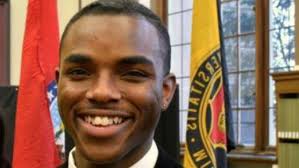MSA president speaks out about racist incident
Share
Explore Our Galleries
Breaking News!
Today's news and culture by Black and other reporters in the Black and mainstream media.
Ways to Support ABHM?
By Ruth Serven, the Columbia Missourian
Payton Head said the first time he was ever called the “N-word” was behind a fraternity house in Greektown when he was walking a friend home from campus at night last spring.
“I’d had experience with racism before, like microaggressions, but that was the first time I’d experienced in-your-face racism,” Head, now a senior and president of the Missouri Students Association, said.
[…]
Then on Friday night, Head said he was walking down Hitt Street when a pickup passed him and a passenger repeatedly shouted racial slurs at him.
“Some guys in the back of a pickup just started yelling the ‘N-word’ at me,” Head said Monday.
This time, his response was a Facebook post on Saturday that brought it to the attention of the MU community.
“I could either not say anything and go about my night, or I could finish my term and stay angry, or I could say something,” Head said in the interview.
In his online post, Head expanded his experience beyond racism and addressed issues of exclusion that multiple MU minority groups face.
“I really just want to know why my simple existence is such a threat to society,” Head wrote. “For those of you who wonder why I’m always talking about the importance of inclusion and respect, it’s because I’ve experienced moments like this multiple times at THIS university, making me not feel included here.”
In his post, Head mentioned aggression against a Muslim woman who wears the hijab, a transgender student who was spat on downtown and students with disabilities trying to navigate Memorial Union. He talked about women who feel uncomfortable walking outside at night.
In both the post and the interview, he described his experience walking past a bar with his partner and having drinks thrown at them.
“I could have easily made this post about myself, but it’s my job to think about the whole community,” Head said.
Head said he wants to challenge the respectability many people think MU has and the notion that racist incidents don’t happen in Columbia, or that the MSA president would be exempt from racism…
“These are some of my experiences and the experiences of the ones closest to me,” Head said in his Facebook post. “This is what I’m fighting against every day in boardrooms, conferences, meetings, classrooms, the Capitol, and in my daily life. This is my reality. Is it weird that I think that I have the right to feel safe here, too? If you see violence like this and don’t say anything, you, yes YOU, are a part of the problem.”
More than 684 people liked Head’s post as of 9:30 p.m. Monday, and there were 645 “shares.” Cathy Scroggs, MU vice chancellor of student affairs, posted on Head’s Facebook page: “Payton is a profile in courage.”
[…]
After the first time he was called a racist insult, Head said, “I didn’t want to be (at MU) anymore.” But this time, he said his duty as president is to make sure MSA and the MU community know that students face racism and other aggression.
“Mizzou is home,” Head said. “But if I don’t expose the issues going on in my own home, how will anything change?”
Read the full article here.
Read more Breaking News here.










Comments Are Welcome
Note: We moderate submissions in order to create a space for meaningful dialogue, a space where museum visitors – adults and youth –– can exchange informed, thoughtful, and relevant comments that add value to our exhibits.
Racial slurs, personal attacks, obscenity, profanity, and SHOUTING do not meet the above standard. Such comments are posted in the exhibit Hateful Speech. Commercial promotions, impersonations, and incoherent comments likewise fail to meet our goals, so will not be posted. Submissions longer than 120 words will be shortened.
See our full Comments Policy here.